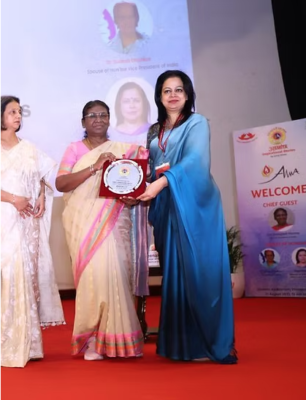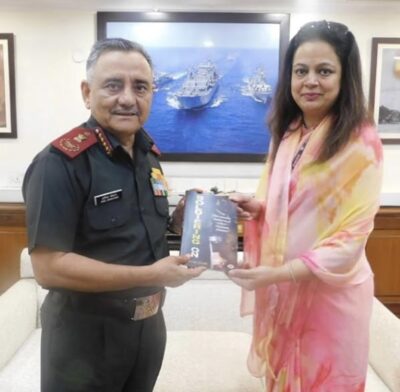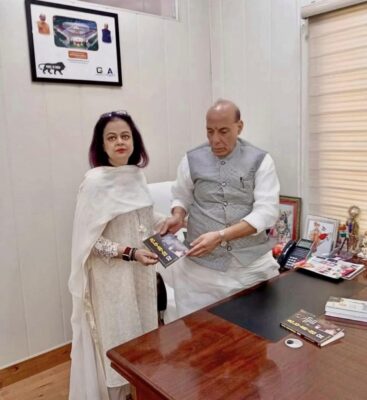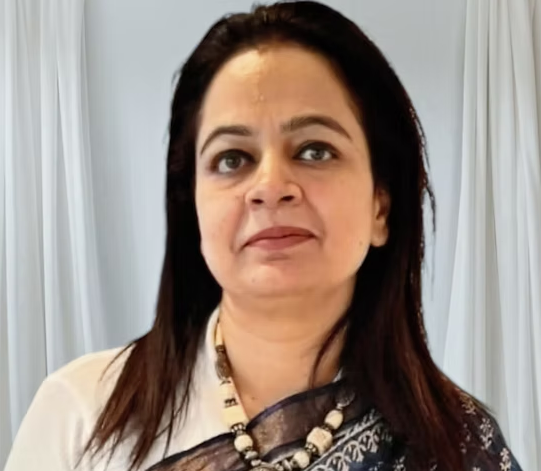
Deeply moved by the heart-wrenching struggles of war widows, known as ‘Veer Naris’ in the Indian Army community, Ambreen Zaidi felt a profound calling to capture and reflect on their unwavering spirit. A proud Army wife herself, Ambreen through her activism and writing, draws attention to the trials these remarkable women endure as they navigate a life of uncertainty following the loss of their soldier husbands in the line of duty.
A celebrated author and influential columnist, Ambreen has earned accolades for her dedication to the cause of advocating for the rights of war widows, orphans, retired soldiers, and disabled veterans. Her exhaustive research and heartfelt narratives published across national and international media platforms, shed light on the often-overlooked struggles of these individuals, thus highlighting a critical need to recognise and support them.
Ambreen Zaidi’s mission goes beyond mere awareness to a deeply felt commitment to transforming lives. Felicitated with many accolades over the years, Ambreen shared her thoughts on what spurs her to campaign for the families struggling to redeem their dignity and find fulfilment in life once again.
Ambreen, you started as a columnist in the Hindustan Times 22 years ago with your monthly column “Olive Greens”. It gives an insightful glimpse into the experiences and challenges of life in the armed forces. What inspired you to delve into writing for columns and what motivates you to write every day?
What essentially inspires me is our soldiers and their families. They are my only source of motivation. When I began to write, I realised there is very little information amongst the civilians concerning our armed forces, especially soldiers and the sacrifices they make. Readers started loving my columns and my inbox was flooded with emails appreciating my writings. My editors were overwhelmed with requests for my columns to be available more frequently, and so from a monthly feature, it quickly transformed into a weekly feature.

Your debut book, “Warrior Widows,” has touched a chord with readers and has met with significant acclaim, even drawing the attention of the Defence Ministry. Tell us about the development of this manuscript.
The book “Warrior Widows” deals with true stories of war widows whose real battle as an individual begins after their husbands have made the supreme sacrifice of laying down their lives for the country. Their strength and resilience in fighting it out for their children and their livelihood after facing such adversity were my primary motivation to write the book. Today, these ‘Veer Naris’ stand as inspiring figures, a testament to resilience, transforming their pain into a powerful journey of self-reinvention.
I couldn’t help writing about them to create greater awareness about their inspiring journey. It was a challenge though to get them to tell their story. Some wanted to speak about it while some didn’t. Some knew what had happened while others were completely clueless. “Ji jang me shaheed ho gaye” was an answer I often got. I would come back numb and dismayed after spending days with these ladies. It took me weeks to inscribe their stories in my book – so traumatic were their journeys!
Could you tell us about the struggles of the ‘Veer Naris’? What are the hurdles they have to endure in the face of tragedy?
As we all are aware, widowhood is viewed very inauspiciously in our society and it’s the unsympathetic societal and familial norms, which they struggle most with. There are instances where these widows had to confront ruthless judgments and harsh scrutiny of their immediate family members after the tragedy. Our armed forces are there for them, taking care of their pensions, compensations, etc. But when they go back to society or their family, they’re faced with agonising challenges, especially regarding their finances and accommodation besides the emotional turmoil and solo parenting they have to go through. Many of them were disowned, yet others were financially fleeced and left to fend for themselves.
To make matters worse, I realised that most bureaucrats lack empathy. For them, these cases are not enough. This attitude stems from their lack of awareness about our soldiers, their families and struggles. Thus, it became all the more imperative to put these stories across through my books.
What about the plight of the young children post such a tragic experience? How do they contend with it? Are they still enthused about joining the forces like their fathers?
In most of the cases I came across, the children were too young to realise the enormity of the tragedy that had struck them. Some were too traumatised to talk about anything or even offer solace to their mothers. For the ones who were a little older, yes, their fathers were their role models and they were enthused to take their legacy forward by joining the forces.

How was the experience of getting your first book published? Were there any challenges?
Yes! Most of the top publishers refused to publish my book as they would deem it as being “repetitive.” Which, if you browse through the chapters of my book, each story is starkly different from the other – each narrative so uniquely unnerving yet bolstering. These women were not in uniform, yet they fought hard, like soldiers. Each narrative inspires a positive approach to brazen out the tests of life.
I was hurt and shocked and did nothing for months. One day when a soldier was killed in action; the entire media was at his home to take bytes from the mourning family members. It was then that I tweeted about this shocking behaviour of the publishing houses. Subsequently, I was flooded with offers from big and small publishers but I decided to go with the publishing house being run by Army veterans. I felt they would better understand my emotions and they did. And that’s how my book The Warrior Widows was published.
Moving on to your second book, “Soldiering On,” which sheds light on bureaucratic and civil apathy concerning the struggles and challenges encountered by soldiers who have been left disabled in the line of duty. Please tell us more about it.
No one cares about disabled soldiers except for their brothers-in-arms. That’s the harsh reality that they all live with. I also learned this fact during my journey of writing the book, ‘Soldiering On.’ There is a complete lack of awareness among the general public concerning the personal battles a disabled soldier has to fight. The soldiers are left to experience gruelling legal battles to obtain disability benefits, which they righteously deserve.
How do you intend to draw attention to the lack of concern these men of honour endure? What are the fundamental challenges these soldiers face to get the benefits they righteously deserve?
Through my writings! I feel this is my calling – to bridge the growing gap between soldiers and society. There’s an urgent need to create more awareness about the sacrifices made by the men in uniform and the challenges they brazen out, even after they’ve served the country. It hurts me to see soldiers and their families struggling for their rightful dues, often battling unsympathetic bureaucracy and disregard. This gap must be bridged so that no soldier ever has to face the indignity of pleading for what they’ve earned with their blood and sweat!
When you’re not sitting at your writing desk to script your thoughts, how do you unwind and rejuvenate your spirit?
My writing and advocacy brings me the greatest joy and fulfilment. Beyond this purpose-driven work, I seek balance through yoga and meditation, which help me in grounding and finding my inner peace. Family vacations too help me wind down and create cherished moments with my loved ones.
Finally, how would Ambreen Zaidi like to be remembered?
I hope to leave behind the legacy of being a good human being…someone who cared deeply for others.

Simran Maharaj
Anything creative gets her going, whether expressing herself through writing, curating beautiful interiors or capturing her moods on the canvas! Married to an Army officer, kindles her spirit for travel, exploration and long, endless walks, which allow her to immerse herself in unique cultures and experiences and spur her imagination. With a background as diverse as Philosophy and Journalism, she loves to reflect on narratives that inspire the human experience of the Divine. Email at – simmar.ms.21@gmail.com

An extremely poignant write up Simran. Keep it up.
Thankyou Preeti, glad you liked it!